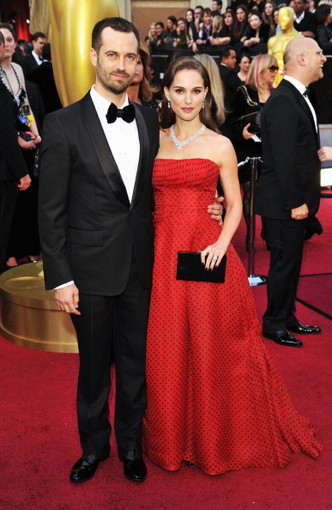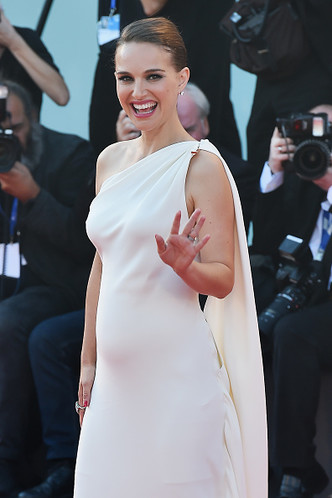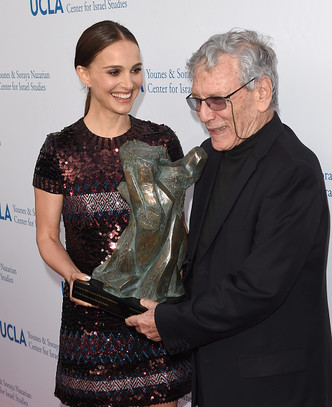From the charming nymphet from «Leon» she is separated by many roles, the beginning of her own directorial career, a diploma in psychology, an Oscar, motherhood. But it also has a lot in common with that 12-year-old. With childlike frankness, she tells how her world has changed over the years spent before our eyes.
Of course, you would never give her her thirty-five. Of course, she is very beautiful, and pregnancy does not distort her chiseled features. And, of course, she is the visible embodiment of success — here is the Oscar, and Dior advertising, and the famous choreographer-husband, and the lovely five-year-old son, and the directorial debut A Tale of Love and Darkness, approved in Cannes …
But from mentioning everything At the same time, a shadow of irritation that is not characteristic of him runs across the face of Natalie Portman. Because «look younger than your years» is an ageist compliment, everyone has the right to look their age, and no one has to strive to be younger; beauty is just winning the genetic lottery, there is no merit to it, and you should not judge another by his appearance; Harvard — “Yes, you know How long humiliation I experienced there because of my stupidity, How long I had to overcome in myself?”, And the husband and son … “This is love. And love is not an achievement or a reward.”
Well, except for an Oscar. she can be proud. But after all, only be proud, not boast …
We sit on the balcony of her hotel over the Venetian Lagoon — far from the island of Lido, where the film festival is in full swing, in the program of which there are two films with her participation. She’s only here for a couple of days, she’s expecting her second child, and now she wants to spend as much time as possible with her son before his brother or sister arrives. Work has now receded into the background for Portman, and she is philosophical — perhaps for the first time in her biography, the time has come when she can look at her life from the outside, outside the hustle and bustle and acting schedules. Here it becomes obvious that it is not in vain that Portman received a diploma in psychology — she easily generalizes her personal experience in a socio-psychological vein.
Natalie Portman: It’s funny how I’m being treated like a terribly fragile creature. And I’m just pregnant, not sick. I have a feeling that pregnancy in our world has lost its naturalness, has become some kind of special phenomenon that requires special treatment — everything is so focused on the conservation of the already existing one that the renewal looks like a wonderful exception.

In general, I notice a lot of changes. Previously, ten years ago, the stars were afraid of the paparazzi, because they wanted to keep their personal lives a secret, now they are embarrassed by their attention, because they want to be “normal” people in the eyes of the public, because superiority in our transparent reality has become bad manners. Indeed, the stars by and large did not deserve public attention in any way …
I used to be a black sheep as a vegan, now this is just one part of the movement for the ethical treatment of nature, one of many. There used to be a strict standard of appearance, thinness was deified, and now, thank God, there are models in XL size, and my stylist says: baby, five kilos would not hurt you …
Psychology: And how do you like this new world?
NP: My favorite university professor also said that the first wave of technological modernization will be followed by another, deep one. Modernization of consciousness. People will demand more openness from politicians, from the stars — an end to merchant revelry, from governments — environmental consciousness. I call it anti-elitism — a revolt of the conscious masses against being tyrannically disposed of, even at the level of tastes, canons, what is allegedly accepted.
I once asked Cate Blanchett how she manages everything, she has four children. And she philosophically remarked: «Dance and learn to dance»
Or, as my journalist friend says, when passengers applaud the pilot after boarding the plane: “But no one applauds me when I submit a 10-word article.” In the new circumstances, professionalism is becoming the norm, now it is permissible to be proud only of exceptional deeds, manifestations of almost heroism. And I, by the way, in this new world have ceased to be a pure vegan, I now have other priorities, it seems to me, higher: I need to be healthy and strong, I’m a mother. This is the main thing.
Did you enjoy being a mother?
NP: To be honest, everything is ambiguous. I don’t think «liked» is the right word here. Before the birth of Aleph, I was very worried — I could not imagine how I would combine work with a child with whom I so wanted to be there always, always … And somehow I asked Cate Blanchett — she is my oldest friend, I love her very much — how she succeed, she has four children. And she philosophically remarked: «Dance and you will learn to dance.» And I stopped worrying.
And when Aleph was born, yes, everything lined up by itself — he became a priority, I even abandoned the idea of a XNUMX-hour babysitter — no one should stand between me and him … Motherhood for me is a unique combination of extremes — baby food and diapers with complete self-denial, anxiety, even horror with delight. You become more vulnerable and more sensitive — because now you have someone to protect. And stronger, more determined — because now you have someone to protect.
In Paris, if you run with your child on the playground, they look askance at you — it’s not accepted
It’s funny, but now I look at a person and think that after all, someone is his mother, and it will hurt her if her child is treated harshly. And I soften even in the toughest situations. But the view of things is somewhat distorted. After two years in France — my husband had a contract there to direct the Opera de Paris ballet — we returned to Los Angeles. And you know, in comparison with Paris … Someone smiles at my child in a cafe, and I am delighted — what a wonderful person, friendly, open!
Or perhaps nothing of the sort. It’s just that in America it’s normal to smile at a baby, create an atmosphere of warmth and acceptance for him. In Paris, if you run around the playground with your child, they look askance at you — it’s not accepted … And in Los Angeles, everyone tries not to invade your personal space, no one seeks to teach you their good form. I felt this difference — from Paris to Los Angeles — precisely because I have a son.
It seemed to me that you were so disciplined and so often found yourself in a new environment for yourself that you should easily accept any norms … In the end, at the age of 12 you starred in Leon in a foreign country, then, having already become a recognized actress, you ended up in the role of a student, and even in the department of psychology, so far from the film industry …
NP: But new norms and rudeness are different from each other, aren’t they?
Coarseness?
NP: Well, yes, in Paris, if you do not obey the local behavioral norms, you can be quite harsh with you. There is… a sort of obsession with etiquette. Even a simple trip to the store can be stressful because of the «protocol» you have to follow. One of my Parisian friends kept teaching me «shopping etiquette»: you are looking for, for example, a thing of your size. But first, you must definitely tell the seller: “Bonjour!” Then you have to wait 2 seconds and ask your question.
My ex called me “Moscow”, he said: sometimes you look out the window so sadly … It’s just “Three sisters” — “To Moscow! To Moscow!»
If you went in, looked at the hangers and asked: “Do you have the 36th?”, you were rude, and you can be rude in return. They do not think about making the person next to you more comfortable. They think about the protocol. Perhaps in this way they are trying to preserve their culture. But it was hard for me. You see, in France I felt really tired of the rules. I have always been too disciplined. Now I am guided more by feeling. I want others around me to be comfortable, so that no one feels stressed, and I behave accordingly.
Does psychology education affect your behavior in any way? Do you think you understand people more than others?
NP: Oh, yes, you treat psychologists like gurus. But in vain. It seems to me that I am just a real psychologist — each person for me is not a book already written and published in a certain edition, which you just need to open and read, but a unique creation, a mystery that needs to be understood.
Are you a specialist in child psychology, does this help in relations with your son?
NP: We are all equal when we recognize our children. And everyone is helpless before a miracle — meeting this person, your child. You know, I’m pretty sure I’ll be a good grandmother. That’s when — with the experience of motherhood and knowledge of psychology — I will clear up. And now there is not enough distance between us — I belong too much to Aleph.

But the director must be a bit of a psychologist. In the work on «The Tale of Love and Darkness» the diploma was definitely not superfluous. Moreover, your heroine in it suffers from a personality disorder … By the way, the debutant director, who also decides to play the main role in his own film, is a brave person.
NP: In my case, not at all, not courage and not even special work. And the psychology here, to be honest, is not very out of place. The fact is that I shot a film in Israel and about Israel. in Hebrew. About love, indissoluble attachment between a son and his mother against the backdrop of the formation of the state of Israel. This is a film about the growing up of a country and a person. And it is based on the piercing autobiographical story of the great, without exaggeration, the great Amos Oz.
Everything is from the air of Israel. And Israel is my country. I was born there, my family is from there, we sometimes speak Hebrew at my parents’ house, and the Jewish heritage in our family is very strong … «A Tale of Love and Darkness» is my film in full, no one could play this role in it, except for me. It would just take away the meaning of the film for me, the personal meaning that I put into it. Because for me it is a way to express my love for the country and define my identity.
You know, all my American friends in their youth in one way or another asked this question — who am I? what am I? But for me, there has never been such a question: I am a Jew, a Jew and an Israeli. When you say, «I’m from Israel,» people tend to start a 10-hour conversation about current politics that way. But for me there is no politics here, I’m just from Israel, from a country that, yes, was at the forefront of civilizational processes, but I’m just from Israel. And I belong to Israel no less than to America.
What exactly does it mean to you to belong to Israel?
NP: It’s… When I first encountered Buddhism, I was a bit confused. Buddhism is about appreciating what you have and where you are now. And I was like all of Judaism, which … Which is somehow inextricably linked with longing for what you do not have. In the homeland from which the Jews were expelled. And this very parting of ours “Next year in Jerusalem” is strange, as if Jerusalem still does not belong to the Jews.
The language itself speaks for us: Israel is built into our religion as something we don’t have. But we already have it, the homeland has been regained. And longing is still right there … And I have it — melancholy. Sometimes it shows through. Although… I also have Eastern European roots, and much in our family culture, and in my character – from there. Perhaps from Russia, where my great-grandmother comes from.

O le ā, mo se faataʻitaʻiga?
NP: Yes, that melancholy. One of my boyfriends thought that she was not Jewish, but completely Russian. He even called me «Moscow». And he said: you don’t notice, but the way you sometimes freeze and look out the window so sadly … It’s just “Three Sisters” — “To Moscow! To Moscow!» He sometimes even asked me to stop «Muscovite». Slavic romantic spleen — that’s what Oz calls this state. But we also tend to expect miracles.
And you, it seems, have nothing to look forward to — your life already looks wonderful.
NP: That’s for sure, I’m very lucky: I already have a lot of miracles. However, if you think that they are related to career or fame, you are wrong. I met an amazing man — Amos Oz. Miracle. I manage to spend a lot of time at home. We even set our own rituals — on Thursdays a car comes to our house for garbage, and I am always at home on Thursday. Miracle. On weekends we meet with friends and their children. Almost every weekend. Miracle. Before coming here, Aleph and I were walking in the park, and for the first time he saw a rabbit. And I saw his eyes. It was definitely a miracle. Unlike the rabbit that darted away from Aleph at the speed of a flying saucer, my miracles are… tame.










